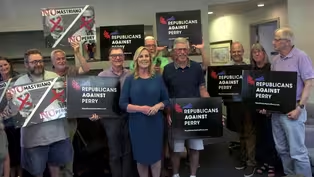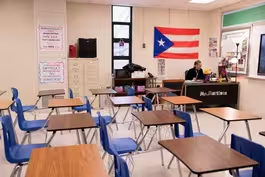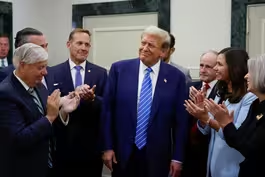
G7 backs using frozen Russian assets to aid Ukraine
Clip: 6/13/2024 | 8m 40sVideo has Closed Captions
Biden, Zelenskyy sign security pact as G7 backs using frozen Russian assets to aid Ukraine
President Biden signed a defense pact with Ukraine on the sidelines of the G7 meeting in Italy. The major industrialized powers also agreed on a plan to take Russian assets held in Europe and use that money to aid Ukraine in its fight. Nick Schifrin discussed more with Adam Smith, a former senior adviser in the Treasury Department during the Obama Administration.
Problems playing video? | Closed Captioning Feedback
Problems playing video? | Closed Captioning Feedback
Major corporate funding for the PBS News Hour is provided by BDO, BNSF, Consumer Cellular, American Cruise Lines, and Raymond James. Funding for the PBS NewsHour Weekend is provided by...

G7 backs using frozen Russian assets to aid Ukraine
Clip: 6/13/2024 | 8m 40sVideo has Closed Captions
President Biden signed a defense pact with Ukraine on the sidelines of the G7 meeting in Italy. The major industrialized powers also agreed on a plan to take Russian assets held in Europe and use that money to aid Ukraine in its fight. Nick Schifrin discussed more with Adam Smith, a former senior adviser in the Treasury Department during the Obama Administration.
Problems playing video? | Closed Captioning Feedback
How to Watch PBS News Hour
PBS News Hour is available to stream on pbs.org and the free PBS App, available on iPhone, Apple TV, Android TV, Android smartphones, Amazon Fire TV, Amazon Fire Tablet, Roku, Samsung Smart TV, and Vizio.
Providing Support for PBS.org
Learn Moreabout PBS online sponsorshipGEOFF BENNETT: President Biden signed a defense pact today with Ukraine on the sidelines of the G7 meeting in Italy.
The Group of Seven major industrialized powers also agreed on a plan to take Russian assets held in Europe and use that money to aid Ukraine in its fight against Russia's invasion.
Here's Nick Schifrin.
NICK SCHIFRIN: Another day, another direct Russian hit on a Ukrainian apartment in Kharkiv.
But this day proved different.
A man buried alive was saved, providing hope to a country struggling to hold the line.
MAN: An historic new bilateral security agreement.
NICK SCHIFRIN: And so it was 2,000 miles away.
A security agreement gave Ukraine's leader hope U.S. support would hold.
JOE BIDEN, President of the United States: Our goal is to strengthen Ukraine's credible defense and deterrence capabilities for the long term.
VOLODYMYR ZELENSKYY, Ukrainian President: It is truly a historic day.
And we have signed the strongest agreement within Ukraine and the U.S. since our independence.
NICK SCHIFRIN: Today's U.S.-Ukraine bilateral security agreement commits the U.S. for 10 years to -- quote - - "support Ukraine's efforts to win today's war and deter future Russian military aggression" with weapons, intelligence sharing and long-term training, as well as joint weapons production.
Nowhere has the risk to Ukraine and the importance of Western support been more pronounced than in Kharkiv.
Just a few weeks ago, the center of Vovchansk along the Kharkiv-Russia border had been gutted, at risk of occupation.
Now U.S. and Ukrainian officials say newly arrived Western ammunition and permissions to fire U.S. weapons into Russia allowed Ukraine to hold the line.
Secretary of Defense Lloyd Austin at NATO today.
LLOYD AUSTIN, U.S. Secretary of Defense: But what I see is a slowing of the Russians' advance and a stabilizing of the - - of that particular piece of the front.
NICK SCHIFRIN: Above the summit today, skydivers leaped to the waiting leaders of the world's largest democracies.
They are collectively supporting Ukraine today, but they know long-term U.S. support could be a leap of faith, because former and would-be President Trump has vowed to end the war in Ukraine and question ongoing U.S. military assistance.
Today, Zelenskyy said, no matter the president, he had faith in the American people.
VOLODYMYR ZELENSKYY (through translator): It seems, to me, that no matter who the nation chooses, if the people are with us, any leader will be with us in the struggle for our freedom.
NICK SCHIFRIN: Today, the world's leading democracies also agreed to an unprecedented step, convert the interest on $280 billion of frozen Russian assets currently held in Europe into a loan to help Ukraine buy weapons and repair nearly half-a-trillion dollars of damage.
European Commission President Ursula von der Leyen.
URSULA VON DER LEYEN, President, European Commission: It's not the European taxpayers that are paying for the damage that Putin is causing with this war of aggression, but it is Putin.
NICK SCHIFRIN: And to discuss that part of the story, how the West is converting frozen Russian assets into a loan for Ukraine, I turn to Adam Smith, a partner at Gibson, Dunn & Crutcher and a former senior adviser in the Treasury Department in the Obama administration.
Adam Smith, thanks very much.
Welcome back to the "NewsHour."
NICK SCHIFRIN: How significant is this announcement today?
ADAM SMITH: It's a watershed.
Quite simply, it could change the nature of sanctions.
This could change the nature of the way sovereign powers around the world think about their own assets.
This was a significant issue.
It's been thought about since the day after Russia invaded Ukraine back in 2022.
And the fact that they have done it now two years hence suggests how difficult it was, I think, for all parties to get around the idea of going after sovereign assets.
NICK SCHIFRIN: So explain more how exactly it is so existential or so significant.
And I guess take us through some of the concerns that European countries had and, in fact, some U.S. officials had initially about making this move.
ADAM SMITH: Yes, I think there are two concerns.
One is perhaps a little less significant than the other.
The first is retaliation.
What that means is that, if we can do that to Russia, Russia can do that to us.
And that's true, and it's definitely a concern for the Europeans, because there's a lot more engagement between Russia and Europe.
It's much less of a concern for the U.S., but it's not a zero-sum concern.
But, of course, if Russia can do it, then others can do it as well, be it China, India, what have you, any other jurisdiction that sort of wants to.
The other issue, of course, is, what does it mean systemically?
I mean, one of the linchpins of global finance is the fact that sovereign assets have historically been essentially inviolable, right?
You can't go after them.
And if we're undoing that, so the fact that anyone who keeps their assets in the United States, for example, which many, many countries do, because they're invested in Treasury bills or otherwise, and if all of a sudden that's a risk because they could theoretically be seized, taken or otherwise immobilized, that's a significant risk for the way global finance has been structured here before.
NICK SCHIFRIN: So the risks presumably still exist today after the announcement.
How were those concerns overcome?
ADAM SMITH: Well, they were overcome, I think, through a little bit of legal trickery.
So for the Europeans and the U.S. alone, the U.S. as well, they actually have -- they're actually not going to be seizing Russian assets, per se.
The $300 billion worth of assets, two-thirds of which are in Europe, a tiny portion of which were in the United States, what they're actually going to do is they're basically going to use the interest on those assets.
So the $180 billion worth of Russian assets sitting in Europe obviously creates interest, and the smaller amount in the U.S. also has interest, much like a savings account.
And what they're going to do is use that interest, not the principal, rather, but the interest, to collateralize a $50 billion loan to Ukraine.
So it's not only removed from the perspective of the principal, so the underlying asset of Russia is not going to be touched, just the interest.
But, on top of that, they're actually only going to sort of take that if -- quote, unquote -- "the loan" that they're giving to Ukraine is not repaid.
So it's just collateral, essentially, rather than going after a direct seizing of Russian assets by either the Europeans or the Americans.
NICK SCHIFRIN: And so there's been a lot of discussion politically in this country whether the U.S. should continue to send money to Ukraine or whether it should be structured as a loan.
The language today is a $50 billion loan.
Is that the kind of loan that the U.S. and the West expects to be paid back?
ADAM SMITH: I don't think so.
I mean, who knows?
But I certainly don't think that's the idea.
I haven't seen what the terms of the loan are.
They are very, very long terms for repayment.
Then it becomes sort of a null issue.
So, in other words, the loan may not be repaid, but it may not ever be due also.
But I don't think anyone thinks this is anything other than, frankly, Russia paying for some of the funds that the West is trying to send to Ukraine.
NICK SCHIFRIN: Jake Sullivan has made this point in the last 24 hours, that this is the political agreement by the leaders of the seven largest democracies in the world.
What comes next?
What technicalities have to be worked out?
ADAM SMITH: Just how to move the assets and how to sort of engage with the interest payments.
Now, the Europeans have already done this in a way.
So they have got $100 billion -- $180 billion sitting in an account.
They actually have established a separate account or separate accounts for those interest payments.
The U.S. has not done that, but they will need to do that.
And I think they can do that fairly simply with sort of an administrative action.
But then we need to structure a loan that's sort of -- that is approved, of course, by all parties, including the Ukrainians.
And then you would figure out how to collateralize it by virtue of those assets that are now sort of separated.
In other words, the interest payment assets just need to be separated and tied to whatever loan agreement is finalized with Kyiv.
NICK SCHIFRIN: And, finally, another major economic move by the U.S. this week has been additional sanctions, including secondary sanctions on any country or entity that is helping Russia's defense industrial base.
That is pointed at China.
U.S. officials say China have sent a lot of dual-use items that have really propped up Russia's industrial base.
How significant is it that the U.S. is finally, after many people called for this, instituting secondary sanctions really pointed at China and Chinese companies?
ADAM SMITH: Potentially very significant.
This is a continuation of activity that began at Christmas last year with the new executive order.
Secondary sanctions that were issued yesterday -- or -- sorry, yesterday -- are very meaningful with respect to who they're targeting.
But, as always is the case, we need to figure out enforcement.
So it's one thing to put someone on a sanctions list.
It's another thing to make sure parties are not dealing with those persons on the sanctions list.
And that's where enforcement comes to bear.
And that's where the Europeans and the U.S. and others need to really gear up activity.
NICK SCHIFRIN: Adam Smith, thank you very much.
ADAM SMITH: Thank you.
How some Pennsylvania Republicans protesting party extremism
Video has Closed Captions
Clip: 6/13/2024 | 10m 28s | How some Pennsylvania Republicans are using a congressional race to protest GOP extremism (10m 28s)
Inside filmmaker Steve McQueen's new immersive art exhibit
Video has Closed Captions
Clip: 6/13/2024 | 7m 7s | Inside Oscar-winning filmmaker Steve McQueen's new immersive art exhibit (7m 7s)
Parents, educators weigh in on safety and arming teachers
Video has Closed Captions
Clip: 6/13/2024 | 9m 50s | Parents and educators weigh in on school safety as more states arm teachers on campus (9m 50s)
Supreme Court rejects challenge to mifepristone
Video has Closed Captions
Clip: 6/13/2024 | 2m 59s | Access to mifepristone remains unchanged as Supreme Court rejects abortion pill challenge (2m 59s)
Trump visits Capitol Hill to meet with GOP lawmakers
Video has Closed Captions
Clip: 6/13/2024 | 5m 54s | Trump visits Capitol Hill for first time since Jan. 6 to meet with GOP lawmakers (5m 54s)
Providing Support for PBS.org
Learn Moreabout PBS online sponsorship
- News and Public Affairs

FRONTLINE is investigative journalism that questions, explains and changes our world.

- News and Public Affairs

Amanpour and Company features conversations with leaders and decision makers.












Support for PBS provided by:
Major corporate funding for the PBS News Hour is provided by BDO, BNSF, Consumer Cellular, American Cruise Lines, and Raymond James. Funding for the PBS NewsHour Weekend is provided by...




